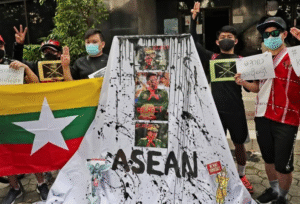“The Arakan Army (AA) is a group that harbors far more hatred toward the Rohingya than either the military regime or the NUG government. The AA is involved in drug and arms trafficking. It also threatens the livelihoods of Bangladeshi communities living along the coastline. Since it’s undermining stability and security in the border areas, we will take necessary actions in the interest of our national welfare.” — Lieutenant General Kamrul Hasan, Bangladesh.
Lt. Gen. Kamrul Hasan, Principal Staff Officer of the Armed Forces Division of Bangladesh, recently made a strong statement against the Arakan Army (AA), accusing it of:
- Hating the Rohingya more than Myanmar’s military junta or the NUG
- Engaging in drug and arms trafficking
- Threatening the livelihoods of Bangladeshi coastal communities
- Destabilizing border security, especially in areas adjacent to Rakhine State
He emphasized that Bangladesh would take necessary actions to protect its national interests and border stability.
This comes amid growing concern that the AA’s control over much of northern Rakhine—including Maungdaw and Buthidaung—is obstructing efforts to repatriate over 1 million Rohingya refugees currently in Bangladesh.
The statement by Lt. Gen. Kamrul Hasan criticizing the Arakan Army (AA) has been reported in Bangladeshi media. It reflects growing concern over border instability and Rohingya repatriation.
Here’s what’s been reported recently:
Key Developments
- Lt. Gen. Kamrul Hasan of Bangladesh made a strong statement accusing the Arakan Army (AA) of being more hostile toward the Rohingya than Myanmar’s military junta or the NUG. He also alleged AA involvement in drug and arms trafficking, and warned that AA activities threaten Bangladeshi coastal communities and border security.
- This aligns with broader concerns voiced by Brig. Gen. (Retd.) M Sakhawat Hossain, who called the AA the “biggest obstacle” to Rohingya repatriation. He emphasized that AA’s control over Rakhine territory complicates efforts to return over 1.2 million Rohingya refugees currently in Bangladesh.
- The AA has reportedly seized 14 out of 17 townships in Rakhine State, including key border areas like Maungdaw and Buthidaung, effectively controlling the frontier with Bangladesh and India.
Regional Implications
- With the Myanmar junta losing ground, India and Bangladesh are reassessing their approach to the AA. Some analysts suggest that despite AA’s hostility toward the Rohingya, its territorial control may force neighboring countries to engage with it diplomatically.
- The situation remains tense, especially as Bangladesh’s national interest now hinges on maintaining border stability, curbing illicit trafficking, and finding a viable path for Rohingya repatriation.






